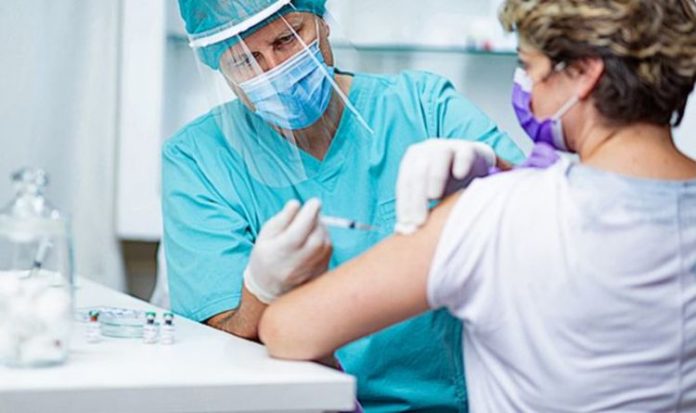Despite the colossal task of protecting the nation, NHS national medical director Professor Stephen Powis assured the public the health service is up to the job. He said: “The NHS will be ready and able to make a start on vaccinating people from day one, despite the huge complexities. While most Covid vaccination is currently expected to take place in the New Year, hardworking NHS staff are already gearing up to get going this side of Christmas if the manufacturers can supply us.”
More than 1,200 GP surgeries are being equipped to dish out 1.2 million vaccines every week as soon as health chiefs approve the treatment.
Health Secretary Matt Hancock has promised the NHS will work around the clock to get the UK vaccinated, with practices open 8am to 8pm every day.
He admitted deploying the vaccine was going to be a “colossal challenge” and said the military were on standby to help.
He told MPs that medicine regulators are on standby to approve the drugs as soon as they pass the final trials.
Mr Hancock said: “I know [the regulators] will rise to the challenge of being ready, when the science comes good, to inject hope into millions of arms this winter.”
A Government source added: “We intend to go as fast as supplies allow. Clearly, if we have more than one vaccine authorised, we potentially will be able to go even faster.
“The NHS is determined that its ability to deliver the vaccine will not be the rate limiting factor. What will be the rate limiting factor is the supply.”

Health Secretary Matt Hancock (Image: JESSICA TAYLOR/UK PARLIAMENT/AFP via Getty Images)
Their optimism came as the daily number of deaths rose to its highest since May 12.
The Government said 532 more people had died within 28 days of testing positive, bringing the UK total to 49,770.
And, as of 9am yesterday, there were a further 20,412 labconfirmed cases, meaning the total is now 1,233,775.
Meanwhile, Mr Hancock set out details of the Government’s readiness to roll out a national vaccination programme following trials by Pfizer that showed a 90 percent success rate in its vaccine earlier this week.
Pledging £150million to set it up, he said: “We in the UK are among the first to identify the promise shown by the [Pfizer] vaccine and we secured an order of 40 million doses. This puts us towards the front of the international pack.”
Two doses are needed per person. He added: “I have tasked the NHS with being ready from any date from December 1.

Two doses are needed per person (Image: Getty Images)
“The logistics are complex, the uncertainties are real and the scale of the job is vast. But I know that the NHS, brilliantly assisted by the Armed Services, will be up to the task.”
NHS England has told England’s 1,250 primary care networks to designate a single practice to administer vaccines in their area capable of delivering vaccines from 8am to 8pm.
The practices will need to have fridge space available by December 1, and “capacity to administer minimum of 975 doses per week or greater”.
Practices will receive a £12.58 payment for each dose of a coronavirus vaccine, meaning they will receive £25.16 for each patient vaccinated in a two-dose course.
Patients will also need to be observed for 15 minutes after the vaccination is administered, while annual flu jabs and Covid-19 vaccinations must be given at least a week apart.
Appointments will be managed through a national booking system. Mr Hancock told the Commons that the UK was “towards the front of the international pack” in the effort to protect people from the disease, thanks to home-grown expertise and investment.

British Prime Minister Boris Johnson (Image: Dominic Lipinski/PA Wire)
He added: “There are many hard days ahead, many hurdles to overcome but our plan is working and I’m more sure than ever that we’ll prevail together.”
Asked if a vaccine could allow some vulnerable people to be reunited with loved ones, including those in care homes, by Christmas, another source said it would depend on the data from the drug trials.
The priority list includes everyone aged 50 and older, with the oldest people being vaccinated first. Care home residents are also at the top of the list.
Officials believe these groups represent 99 percent of those who died during the first wave of the virus.
The vaccination programme will then be extended to the rest of the nation.
Ministers have ordered 300 million further doses from five other vaccine candidates in development, including one from Oxford University and the pharmaceutical giant AstraZeneca.
Meanwhile, Prime Minister Boris Johnson hailed the “Herculean effort” of scientists spearheading the search for a jab.
He took part in discussions yesterday involving the philanthropist Bill Gates and bosses of 10 leading pharmaceutical firms in a video call.
Later, the PM said: “Bill Gates sounded the alarm on the world’s lack of preparation for a major health crisis long before most of us had heard the word coronavirus. We must heed his call to stop something like this ever happening again.”
Mr Gates, who founded a vaccine-promoting foundation, said: “We’re fortunate that Prime Minister Johnson has come up with a smart plan in the UK, and our foundation will continue to work with his government and others to make it a reality.”
Meanwhile Sir John Bell, regius professor of medicine at Oxford University, told MPs that he was “quite optimistic” of enough vaccinations being carried out by Easter for normality to begin to resume in the UK.
But he warned the Government must not “screw up” distribution of the jab.







